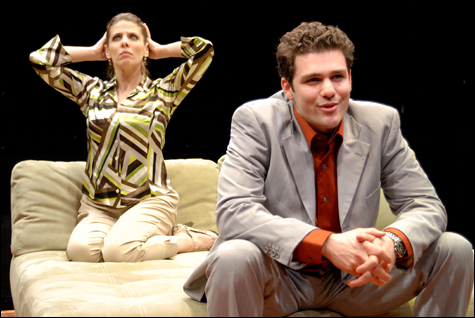
MAKING IT WORK Rachel Morris and Ara Boghigian in 2nd Story's Becky Shaw. |
Although playwright Gina Gionfriddo was raised in Washington, D.C., Rhode Island has also made its contributions, since she polished her writing skills at Brown University, where in the late 1990s she sought out eventual Pulitzer winner Paula Vogel and her MFA playwriting program, attracted by the kind of dark comedy Vogel was coming up with. Gionfriddo later taught writing there and at Providence College and Rhode Island College.
The creator of several well-received plays and a half-dozen prestigious awards and fellowships, from Obie to Guggenheim, perhaps her most celebrated comedy, Becky Shaw, is being staged at 2nd Story Theater (January 21 through February 6). It's been described as a comedy of bad manners and involves a disastrous blind date and numerous problematic personality disorders.
In London for its UK premiere, Gionfriddo took some time out for the following e-mail exchange, which was edited for space.
THENEW YORK TIMES REVIEW OFBECKY SHAW LAST YEAR CALLED IT "A CORKER OF A NEW PLAY" AND "AS ENGROSSING AS IT IS FEROCIOUSLY FUNNY." THAT MUST HAVE BEEN EASY TO TAKE. BUT HOW DO YOU TAKE CRITICAL OBSERVATIONS IN PRINT, AND HAVE THEY EVER PROMPTED CHANGES IN A REWRITE? Ah, reviews. The bad ones hurt and the good ones make me self-conscious and afraid. I only read them if there's a practical reason to read them. I read my Louisville reviews because I knew we were doing [Becky Shaw] in New York and I would have the time and the opportunity to make changes if I wanted to. And I read them in New York because inevitably people are gonna talk to me about them. I think I did some fine-tuning on the Becky character after Louisville, just to be sure what I wanted landed.
WHAT KINDS OF CHANGES DO YOU TEND TO MAKE AFTER YOU SEE AUDIENCE RESPONSES AT WORKSHOP AND PREVIEW PERFORMANCES? I rarely change anything based on audience response. I get the most useful information from actors and dramaturgs during the workshop process. I would say the number one reason I've changed stuff is because an actor can't make it work. When I've got really, really good actors I take very seriously when they tell me that, say, an action doesn't feel truthful or a stretch of dialogue contradicts what I've been asking them to play. We cut an entire scene out of Becky Shaw the week before we started performances in Louisville. It was a good scene, but it was unnecessary and it was killing momentum in the second act. My experience is that actors hate to have lines taken away from them, so when the actors playing this scene said, "Yeah, get rid of it," I knew we were doing the right thing.
YOU'RE A WRITER/PRODUCER FOR NBC SERIESLAW & ORDER. HAS ITS DEMAND THAT YOU GET TO THE POINT QUICKLY AFFECTED YOUR PLAYWRITING? It's actually helped me. I had a playwriting teacher tell me once that the greatest sin in playwriting was to be "willfully obscure." I think my early plays suffered from that, from a tendency to not dig deeply enough and use mystery and character ambiguity as excuses. There was a rigor to the Law & Order formula that I think made me a more effective writer. When you only have 42 minutes to tell a story, you have to get very disciplined about what is important and what isn't, and which details are most revelatory of what you're trying to say.